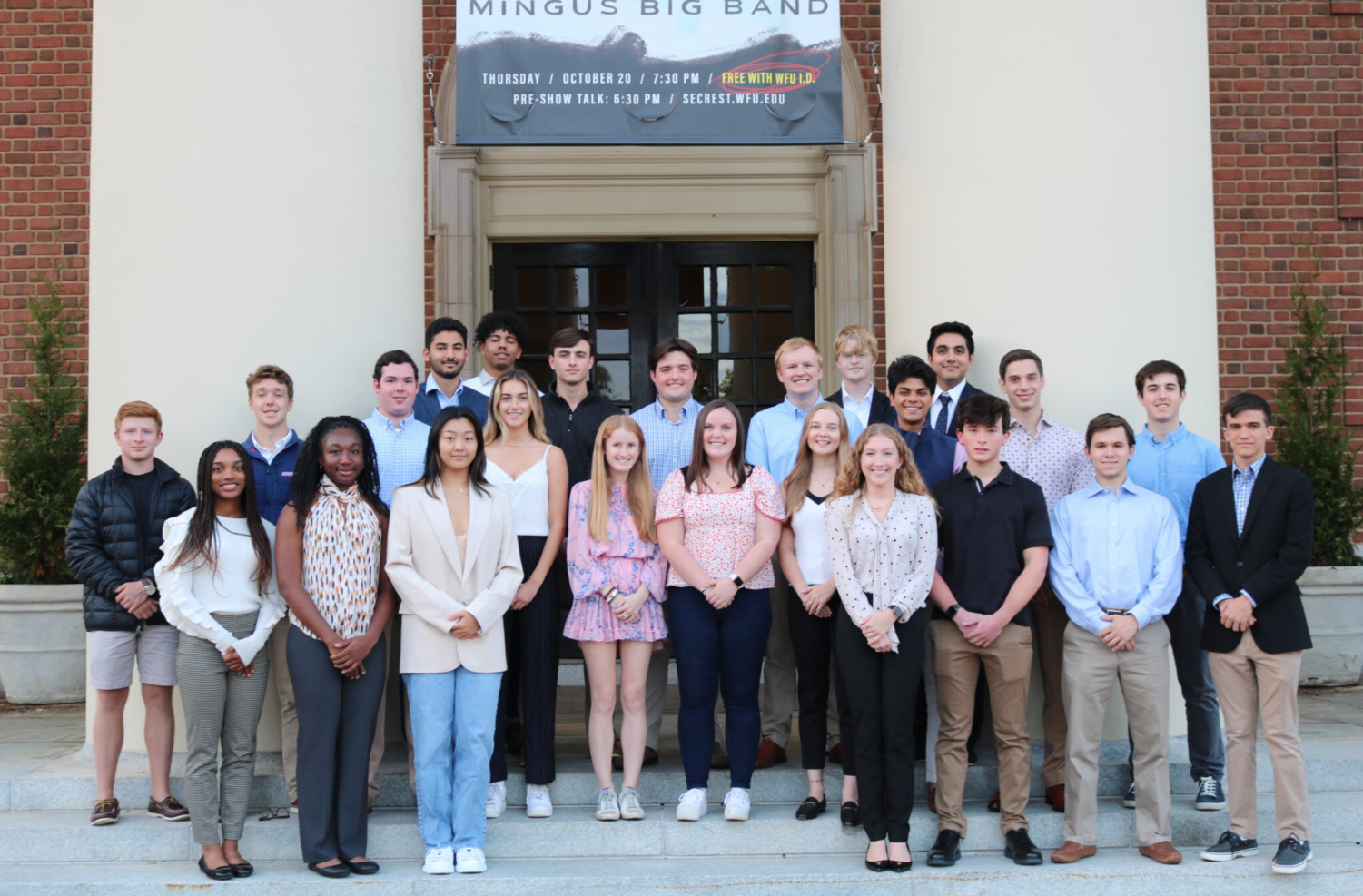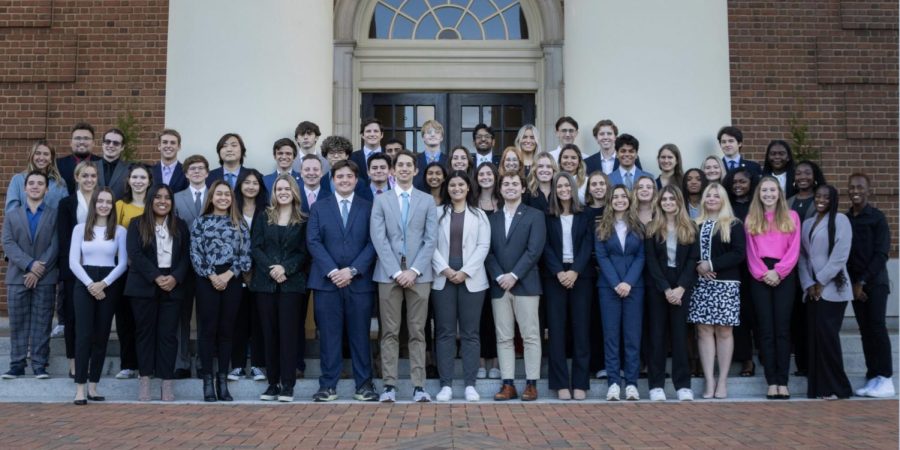Three bills pass unanimously in busy final Senate meeting
Senators approve bills to create a student organization branch, to approve an Election Commission chair and to explore space utilization concerns
Courtesy of Student Government
The Student Government Senate and Student Government’s Executive Board pose for a photograph.
April 21, 2023
During its final meeting of the 2023-24 academic year on Tuesday, the Student Government Senate unanimously passed three measures to enact various internal changes — including the establishment of a Student Organization Branch, approving the appointment of next year’s Elections Commission chair and plans for future benchmarking reports.
“These bills are all parts of different goals throughout the year about restructuring Student Government and thinking about SBAC and student organizations on campus,” Student Body President Pilar Agudelo said.
Creating a new branch
Senate Bill 4 — the first piece of legislation presented at the meeting — restructured how Student Government advocates for and interacts with student organizations. Effective immediately under the provisions of the bill, the Student Organizations Council (SOC) and the Student Budget Advisory Committee (SBAC) will operate under the jurisdiction of the Treasurer.
Previously a part of the legislative body, SOC is composed of two co-chairs and one representative for every 10 student organizations. The council currently oversees student organizations’ charter, but current co-chair Aarya Deshmukh hopes that the new branch will give members of SOC time to expand their influence.
“Hopefully, time could be spent checking in with the other clubs,” Deshmukh said. “Also, not being a part of the Senate allows us to have a larger committee. We’re hoping for an SBAC-size committee of about 20 people where we can evenly distribute all the clubs and give more attention to each one of them.”

Before the end of the academic year, Treasurer Tim Erday will appoint SOC co-chairs and representatives for the 2023-24 academic year. According to the bill, the treasurer may implement further applications during the year based on membership needs.
Alongside the new branch, Senate Bill 4 updated the Student Government Constitution’s language to reflect current statutes and bylaws — including the roles of senators, the secretary and the treasurer. Various sections of the bill list a “good standing” clause, which aims to hold members of Student Government accountable in areas such as meeting attendance and extracurricular commitments. Furthermore, the requirements to run for any Student Government executive office now require good organizational standing with Student Government. Language updates also included the expansion of the nondiscrimination clause in Articles I and II of the Student Government Constitution.
Agudelo explains how the updates provide clarity to member responsibilities and Student Government processes.
“A lot of [the Student Government Constitution and Bylaws] are just outdated,” Agudelo said. “It’s not the process we currently use, and we haven’t held ourselves accountable to those processes … so [we’ve updated] the language in general.”
Claire Hopkins approved as Elections Commission chair
After the Senate voted unanimously to pass Senate Bill 4, Agudelo presented Senate Resolution 11, approving Claire Hopkins as Chair of the Elections Commission for the 2023-24 academic year. Hopkins served on the commission this year as the vice chair. After a quick presentation and an immediate move to proceed to a vote, the Senate voted unanimously to pass the bill.
Agudelo expressed how Hopkins’ position on the Elections Commission this year has given her a unique ability to set goals for the next academic year.
“She’s seen what’s worked and what hasn’t worked,” Agudelo said. “She has a capacity to take what the Elections Commission has done this year and expand on it and create clarity and ensure that communication lines are clear and candidates feel supported.”
Hopkins shared her goals for the upcoming academic year.
“Obviously the primary role of the Elections Commission Chair is to oversee the Commission and ensure a smooth and fair Student Government elections process, so that will be my primary goal in this position,” Hopkins said. “However, the Elections Commission is quite new. This was the first year of the Commission, so there is not a lot of established precedent and I am hopeful that we can create some new procedures that will further solidify the strength of our current elections process.
She continued: “As the Chair, I am part of the decision-making process for the other members of the Commission, and I hope to assemble a group of individuals that will bring different perspectives to the table.”
Space utilization benchmark survey ordered

Senate Resolution 12 was the final piece of legislation presented and unanimously approved during the meeting. Presented by Agudelo, Speaker of the House Jackson Buttler and Treasurer Tim Erday, the resolution resolved that SBAC will provide a benchmarking and recommendations report to both the Senate and university leadership following the findings of a space utilization survey conducted last spring.
From data gathered by SBAC and the Data, Analytics and Benchmarking Committee, these reports will outline student organizations’ common requests for storage space and resources — allowing Student Government to better allocate funds to these organizations.
“We can have all these anecdotal stories that we hear in budget cycles about groups paying for off-campus storage lockers or having repeat items, but we really need the data to back it up,” Erday said. “Our goal would then be to come up with a list of recommendations to the university which we would then bring back to Student Government to propose a solution to how we can best support [student organizations] going forward.”
Looking beyond her term as Student Body President, Agudelo shared how these pieces of legislation will help Student Government support each other and the student body.
“These are just clear-cut things that need to happen to ensure the success of this group,” Agudelo said. “And they’re pretty straightforward. That’s what these are trying to do, whether it’s accountability measures for attendance and Student Government versus creating an entire branch focused on student organizations or really thinking and looking at the data that exists at this university.”























